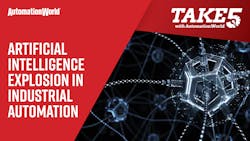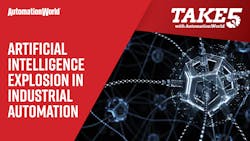Quick hits:
- Learn how AI can impact supply chain demand planning and warehouse management.
- Machine vision-based quality control inspections incorporate AI to inspect more parts at a more thorough level than possible with humans.
- How AI is transforming the creation, development, and deployment of workforce training materials.
Related to this episode:
- How artificial intelligence (AI) works in quality control and is affecting outcomes across the industrial automation space.
- Siemens adds AI via neural networks to controllers, enabling machines to recognize complex patterns.
- Will our use of AI doom humans? Is our approach to AI wrong? Learn more about different approaches to the technology that could deliver its benefits without endangering our species.
- Visit PMMI's Business Intelligence Library and download their executive summaries of their latest reports for free
I'm David Greenfield, Director of Content at Automation World. And thanks for joining me for this Take Five episode where I'll be highlighting what can best be described as an explosion of artificial intelligence applications for manufacturers. So if it seems like everywhere you look these days there's another new automation product or technology application for manufacturers that incorporates artificial intelligence as a key factor, you're not imagining things. That's the reality of the manufacturing technology space these days. In fact, in just the past few weeks Automation World has reported on the use of artificial intelligence in supply chain software, workforce training software, and vision based inspection systems for quality control. And as I'm recording this now, I'm finishing up work on another article that looks at the use of artificial intelligence and welding applications at both John Deere and at Audi. So let's take a quick look at what the most recent advances are all about.
And let's start with supply chain software where artificial intelligence applications range from autonomous trucking to machine learning for warehouse management and demand planning. And looking at how automation technology suppliers across the board are all rushing to add artificial intelligence capabilities to their software, Sean Phillips, the Director of Product Management for QAD DynaSys Supply Chain Software said, "This is the arms race of enterprise software now and that's because there's real value to be had in use cases like demand planning and warehouse management."
And Bill Panak, the Vice President of Data Sciences at supply chain software supplier Logility said, "Demand planning is a good place to begin with artificial intelligence for many companies because of the overwhelming proof that machine learning algorithms outperform the classic models used for building a forecast." And he said that machine learning enables automatic adjustment, which is particularly useful in so-called black swan events like the pandemic we're dealing with now.
He said, "The machine learning capabilities and Logility's demand planning application can spot patterns and trends and all types of data long before human planner would. And the technology can also help optimize pricing and promotions too." And you can read more about this at the URL here.
Deephow is a company that develops software that allows users to record videos that instruct workers on how to perform specific tasks and processes. From here, the content is uploaded to a database where a suite of AI tools streamline the curation and distribution of the materials for training purposes. And here's basically how it works. First, Deephow automatically transcribes the spoken language dialogue in the video, providing searchable timestamp texts next to the video. Then Deephow analyzes the recorded content to break it down into a series of chapters or steps allowing viewers to more easily navigate to the section that best fits what they're looking for.
At this point each uploaded item becomes its own module so that if small parts of a process change or new protocols are implemented, a single portion of the overall training video can be replaced without needing to rerecord the entire series of steps. And Deephow estimates that its smart video delivery system is 10 times faster than traditional video editing and dissemination techniques and has been shown to deliver a 25% improvement in worker performance. And you can read more about this at this URL.
Now, one of the more interesting applications of artificial intelligence I've seen, and one with potentially the biggest bottom line impact for most manufacturers is its use in improving quality control inspections. And Neurala is one company that's been at the forefront of this, and we've covered them quite a bit over the past year. And recently we learned that they're working with FLIR Systems, a well-known supplier of imaging cameras and sensors to deliver an AI based industrial imaging system.
Now, according to the companies, this new imaging system allows users to create deep learning models using Neurala's brain builder, with little data and no AI expertise needed. And these models can be directly uploaded to a Firefly DL camera using FLIR's free Spinnaker software development kit. And because of this, models can be deployed directly onto the camera the companies claim an intelligent automated inspection point can be placed practically anywhere in line and quickly reconfigured for new applications. And typical applications for this imaging system include printed circuit board inspection, detection of foreign objects, identification of surface level metal defects and product uniformity issues. And you can read more about this development at this URL.
So I hope you found this Take Five with Automation World to be worth your time, and remember to keep watching this space for new episodes each week to keep you on top of what's happening in the world of industrial automation.






